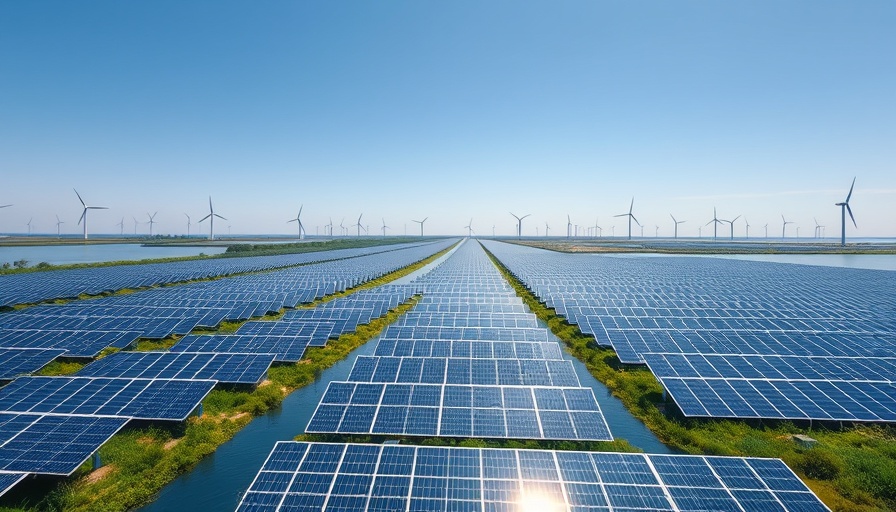
The Surge in Global Energy Investment: What It Means for Hospitality
As the world gears up for a record-breaking global energy investment of $3.3 trillion by 2025, the hospitality industry stands to gain significantly from this transition towards clean technologies. The recent report by the International Energy Agency (IEA) indicates that approximately $2.2 trillion of this investment will be directed towards clean energy initiatives, including renewable sources like solar energy, which highlight the shift towards sustainable practices. For boutique hospitality professionals, this represents a unique opportunity to embrace eco-friendly practices and attract environmentally-conscious travelers.
Understanding the Shift: Clean Energy Is the Future
According to IEA Executive Director Fatih Birol, energy security is a primary driver behind this substantial rise in investment. Amid global geopolitical tensions, countries and companies are focusing on stable and sustainable energy sources. Hence, the hospitality sector, traditionally reliant on fossil fuels, should consider incorporating renewable energy systems into their operations, not just to align with global trends but also to gain a competitive edge. This pivot towards clean energy can significantly impact operational costs and enhance the appeal of eco-conscious lodging options.
Case Study: China’s Dominance in Clean Technology Investment
China has emerged as a leader in global energy investment, spending more than double that of the European Union. With nearly a third of all clean energy spending worldwide now directed towards Chinese projects, it's crucial for hospitality professionals to recognize emerging trends. Sustainable practices, such as utilizing locally sourced materials or investing in solar panels, can provide significant cost savings and enhance guest satisfaction. For boutique hotels or eco-lodges, following China's lead could pave the way for innovative energy solutions while fostering a connection with nature.
Innovative Solutions to Climate Change for Hospitality
With the increasing focus on clean technologies, several innovative solutions can address the pressing climate challenges posed by the hospitality sector. Incorporating sustainable practices not only appeals to environmentally-conscious consumers but also helps build resilience against climate-related disruptions. Options such as chaos gardening—creating self-sustaining gardens that attract local wildlife and pollinators—can enhance the on-site experience for guests while promoting biodiversity. This combination of sustainability and innovation could become central to a boutique hospitality business, solidifying its reputation as eco-friendly.
Aligning Business Practices with Climate Awareness
As climate awareness grows among consumers, it's vital for boutique hospitality professionals to adapt. The advantages of investing in clean energy extend beyond sustainability; they foster a heightened sense of purpose in business. Emphasizing practices such as reducing plastic usage, supporting local nature reserves, and using alternative leather options not only minimizes your ecological footprint but creates memorable experiences for guests who value sustainability. Enhancing your business's eco-credibility can differentiate you in a saturated market, inviting more conscientious travelers.
Future Trends: The New Age of Clean Energy in Hospitality
The transition to an electrified energy ecosystem points to expansive growth in electricity-focused investments. An estimated 50% more will be allocated to electricity generation, grids, and storage compared to fossil fuels. Hospitality businesses can capitalize on this by undergoing electrification—utilizing electric vehicles for guest transportation or integrating smart technology to manage energy usage more efficiently. Understanding these future trends is essential for creating a resilient and forward-thinking hospitality business.
Common Misconceptions About Hospitality and Clean Energy
Many hospitality professionals may perceive the shift to clean technologies as financially daunting. However, initial investments in renewable energy often yield long-term savings and can be catalyzed via government incentives or partnerships with clean tech companies. Addressing these misconceptions directly can create a pathway for a more sustainable and economically viable business model. Emphasizing the importance of resilient business operations, particularly in light of global challenges, positions smaller hospitality ventures at a competitive advantage.
As we approach 2025, understanding these energy investment trends will empower boutique hospitality professionals to lead in environmental stewardship. Investing in clean technologies not only demonstrates a commitment to sustainability but opens doors to a new market segment eager for green initiatives in lodging. Embracing this change will not only align with global efforts to combat climate change but will also enhance the experience for guests seeking eco-friendly accommodations.
To thrive in this evolving landscape, don't hesitate to explore innovative practices like chaos gardening and sustainable sourcing. Connect with like-minded professionals and leverage collective knowledge for mutual growth in your green hospitality endeavors.
 Add Row
Add Row  Add
Add 




 Add Row
Add Row  Add
Add 

Write A Comment